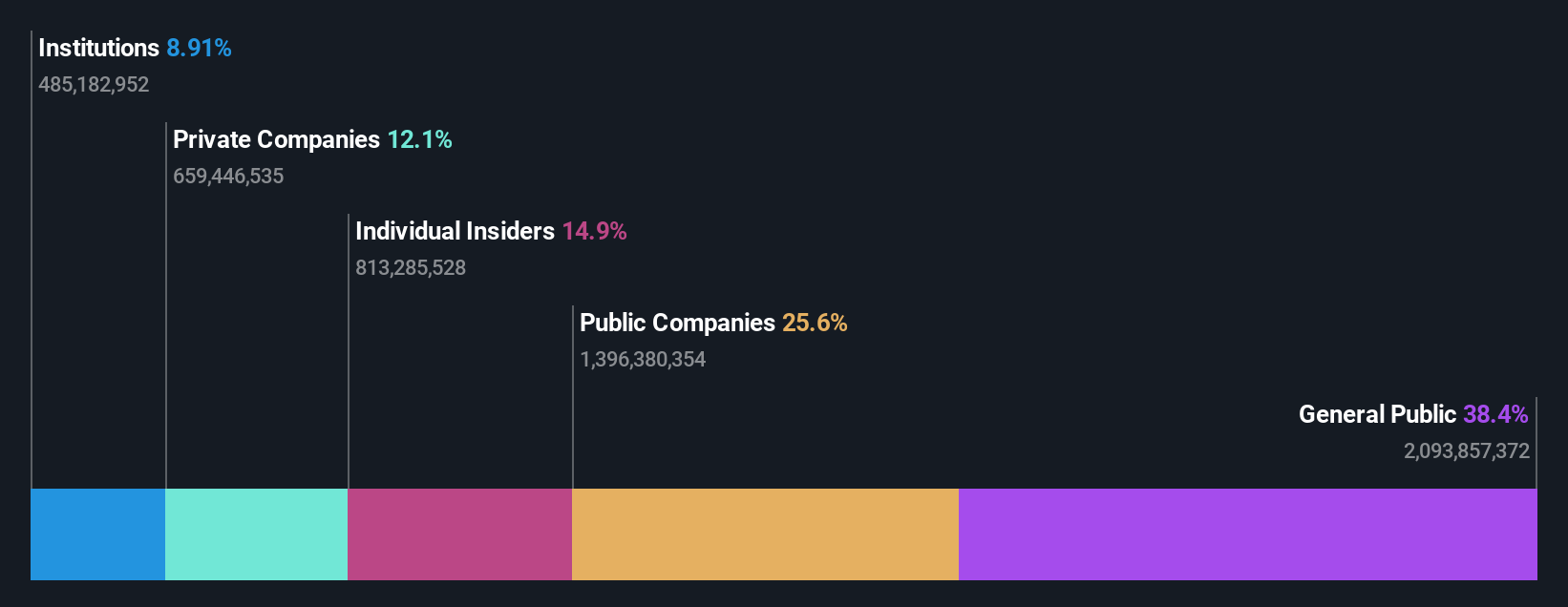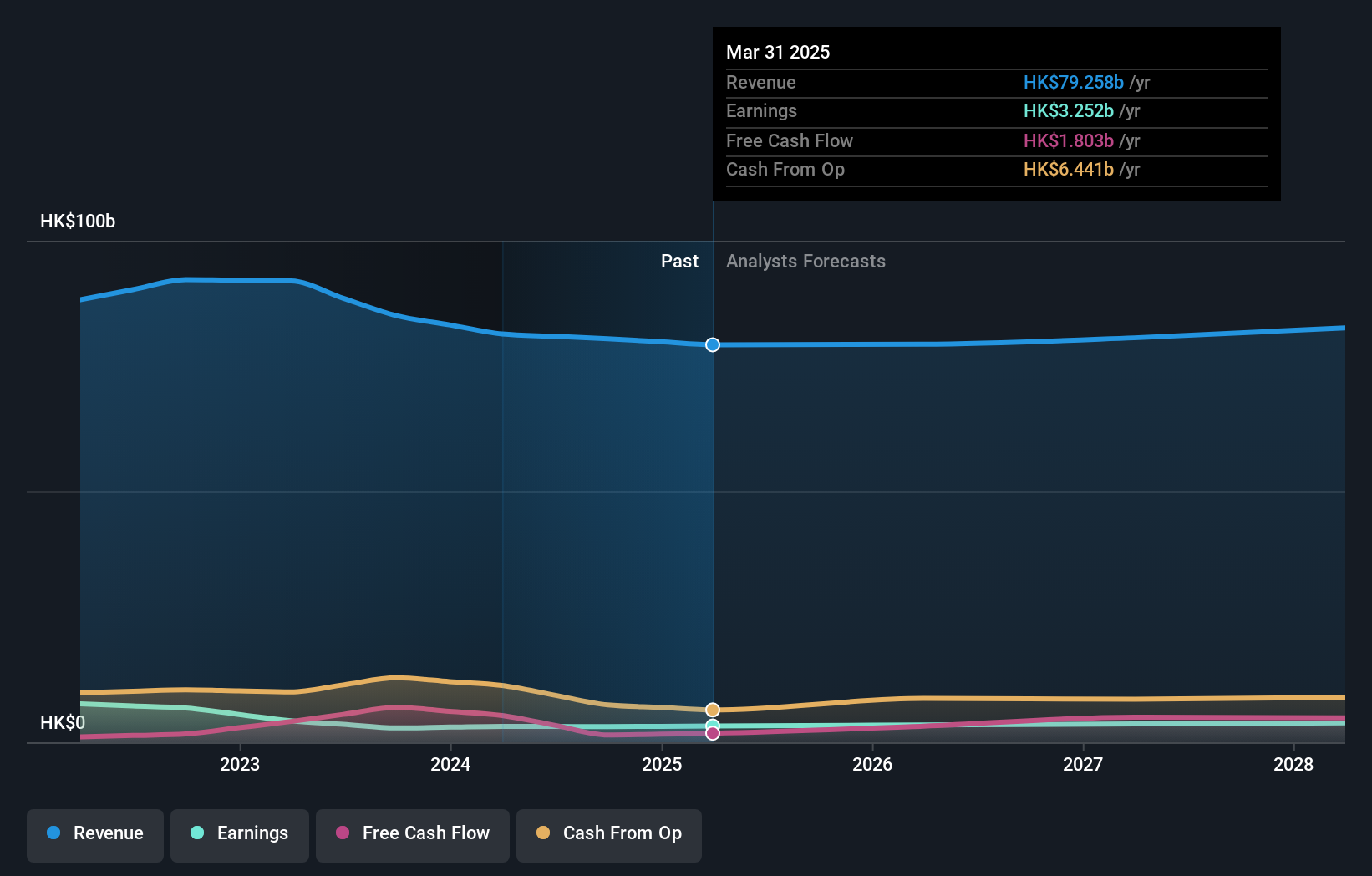- Hong Kong
- /
- Gas Utilities
- /
- SEHK:384
While public companies own 26% of China Gas Holdings Limited (HKG:384), retail investors are its largest shareholders with 38% ownership
Key Insights
- Significant control over China Gas Holdings by retail investors implies that the general public has more power to influence management and governance-related decisions
- The top 4 shareholders own 52% of the company
- Insiders have bought recently
A look at the shareholders of China Gas Holdings Limited (HKG:384) can tell us which group is most powerful. And the group that holds the biggest piece of the pie are retail investors with 38% ownership. That is, the group stands to benefit the most if the stock rises (or lose the most if there is a downturn).
And public companies on the other hand have a 26% ownership in the company.
Let's take a closer look to see what the different types of shareholders can tell us about China Gas Holdings.
Check out our latest analysis for China Gas Holdings

What Does The Institutional Ownership Tell Us About China Gas Holdings?
Institutions typically measure themselves against a benchmark when reporting to their own investors, so they often become more enthusiastic about a stock once it's included in a major index. We would expect most companies to have some institutions on the register, especially if they are growing.
We can see that China Gas Holdings does have institutional investors; and they hold a good portion of the company's stock. This suggests some credibility amongst professional investors. But we can't rely on that fact alone since institutions make bad investments sometimes, just like everyone does. If multiple institutions change their view on a stock at the same time, you could see the share price drop fast. It's therefore worth looking at China Gas Holdings' earnings history below. Of course, the future is what really matters.

We note that hedge funds don't have a meaningful investment in China Gas Holdings. Our data shows that Beijing Enterprises Holdings Limited is the largest shareholder with 26% of shares outstanding. Meanwhile, the second and third largest shareholders, hold 12% and 12%, of the shares outstanding, respectively. Ming Hui Liu, who is the third-largest shareholder, also happens to hold the title of Chairman of the Board.
On looking further, we found that 52% of the shares are owned by the top 4 shareholders. In other words, these shareholders have a meaningful say in the decisions of the company.
Researching institutional ownership is a good way to gauge and filter a stock's expected performance. The same can be achieved by studying analyst sentiments. There are a reasonable number of analysts covering the stock, so it might be useful to find out their aggregate view on the future.
Insider Ownership Of China Gas Holdings
The definition of company insiders can be subjective and does vary between jurisdictions. Our data reflects individual insiders, capturing board members at the very least. Management ultimately answers to the board. However, it is not uncommon for managers to be executive board members, especially if they are a founder or the CEO.
I generally consider insider ownership to be a good thing. However, on some occasions it makes it more difficult for other shareholders to hold the board accountable for decisions.
Our information suggests that insiders maintain a significant holding in China Gas Holdings Limited. It is very interesting to see that insiders have a meaningful HK$6.2b stake in this HK$42b business. Most would say this shows a good degree of alignment with shareholders, especially in a company of this size. You can click here to see if those insiders have been buying or selling.
General Public Ownership
With a 38% ownership, the general public, mostly comprising of individual investors, have some degree of sway over China Gas Holdings. While this group can't necessarily call the shots, it can certainly have a real influence on how the company is run.
Private Company Ownership
We can see that Private Companies own 12%, of the shares on issue. It might be worth looking deeper into this. If related parties, such as insiders, have an interest in one of these private companies, that should be disclosed in the annual report. Private companies may also have a strategic interest in the company.
Public Company Ownership
We can see that public companies hold 26% of the China Gas Holdings shares on issue. It's hard to say for sure but this suggests they have entwined business interests. This might be a strategic stake, so it's worth watching this space for changes in ownership.
Next Steps:
While it is well worth considering the different groups that own a company, there are other factors that are even more important. For example, we've discovered 2 warning signs for China Gas Holdings (1 is a bit unpleasant!) that you should be aware of before investing here.
If you would prefer discover what analysts are predicting in terms of future growth, do not miss this free report on analyst forecasts.
NB: Figures in this article are calculated using data from the last twelve months, which refer to the 12-month period ending on the last date of the month the financial statement is dated. This may not be consistent with full year annual report figures.
New: AI Stock Screener & Alerts
Our new AI Stock Screener scans the market every day to uncover opportunities.
• Dividend Powerhouses (3%+ Yield)
• Undervalued Small Caps with Insider Buying
• High growth Tech and AI Companies
Or build your own from over 50 metrics.
Have feedback on this article? Concerned about the content? Get in touch with us directly. Alternatively, email editorial-team (at) simplywallst.com.
This article by Simply Wall St is general in nature. We provide commentary based on historical data and analyst forecasts only using an unbiased methodology and our articles are not intended to be financial advice. It does not constitute a recommendation to buy or sell any stock, and does not take account of your objectives, or your financial situation. We aim to bring you long-term focused analysis driven by fundamental data. Note that our analysis may not factor in the latest price-sensitive company announcements or qualitative material. Simply Wall St has no position in any stocks mentioned.
About SEHK:384
China Gas Holdings
An investment holding company, operates as an energy supplier and service provider in the People’s Republic of China.
Established dividend payer with proven track record.
Similar Companies
Market Insights
Community Narratives




